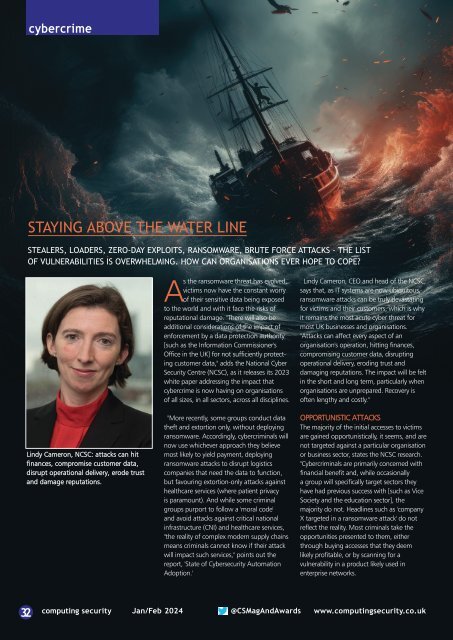CS Jan-Feb 2024
Create successful ePaper yourself
Turn your PDF publications into a flip-book with our unique Google optimized e-Paper software.
cybercrime<br />
STAYING ABOVE THE WATER LINE<br />
STEALERS, LOADERS, ZERO-DAY EXPLOITS, RANSOMWARE, BRUTE FORCE ATTACKS - THE LIST<br />
OF VULNERABILITIES IS OVERWHELMING. HOW CAN ORGANISATIONS EVER HOPE TO COPE?<br />
Lindy Cameron, N<strong>CS</strong>C: attacks can hit<br />
finances, compromise customer data,<br />
disrupt operational delivery, erode trust<br />
and damage reputations.<br />
As the ransomware threat has evolved,<br />
victims now have the constant worry<br />
of their sensitive data being exposed<br />
to the world and with it face the risks of<br />
reputational damage. "There will also be<br />
additional considerations of the impact of<br />
enforcement by a data protection authority<br />
[such as the Information Commissioner's<br />
Office in the UK] for not sufficiently protecting<br />
customer data," adds the National Cyber<br />
Security Centre (N<strong>CS</strong>C), as it releases its 2023<br />
white paper addressing the impact that<br />
cybercrime is now having on organisations<br />
of all sizes, in all sectors, across all disciplines.<br />
"More recently, some groups conduct data<br />
theft and extortion only, without deploying<br />
ransomware. Accordingly, cybercriminals will<br />
now use whichever approach they believe<br />
most likely to yield payment, deploying<br />
ransomware attacks to disrupt logistics<br />
companies that need the data to function,<br />
but favouring extortion-only attacks against<br />
healthcare services (where patient privacy<br />
is paramount). And while some criminal<br />
groups purport to follow a 'moral code'<br />
and avoid attacks against critical national<br />
infrastructure (CNI) and healthcare services,<br />
"the reality of complex modern supply chains<br />
means criminals cannot know if their attack<br />
will impact such services," points out the<br />
report, 'State of Cybersecurity Automation<br />
Adoption.'<br />
Lindy Cameron, CEO and head of the N<strong>CS</strong>C,<br />
says that, as IT systems are now ubiquitous,<br />
ransomware attacks can be truly devastating<br />
for victims and their customers, which is why<br />
it remains the most acute cyber threat for<br />
most UK businesses and organisations.<br />
"Attacks can affect every aspect of an<br />
organisation's operation, hitting finances,<br />
compromising customer data, disrupting<br />
operational delivery, eroding trust and<br />
damaging reputations. The impact will be felt<br />
in the short and long term, particularly when<br />
organisations are unprepared. Recovery is<br />
often lengthy and costly."<br />
OPPORTUNISTIC ATTACKS<br />
The majority of the initial accesses to victims<br />
are gained opportunistically, it seems, and are<br />
not targeted against a particular organisation<br />
or business sector, states the N<strong>CS</strong>C research.<br />
"Cybercriminals are primarily concerned with<br />
financial benefit and, while occasionally<br />
a group will specifically target sectors they<br />
have had previous success with [such as Vice<br />
Society and the education sector], the<br />
majority do not. Headlines such as 'company<br />
X targeted in a ransomware attack' do not<br />
reflect the reality. Most criminals take the<br />
opportunities presented to them, either<br />
through buying accesses that they deem<br />
likely profitable, or by scanning for a<br />
vulnerability in a product likely used in<br />
enterprise networks.<br />
32<br />
computing security <strong>Jan</strong>/<strong>Feb</strong> <strong>2024</strong> @<strong>CS</strong>MagAndAwards www.computingsecurity.co.uk
















